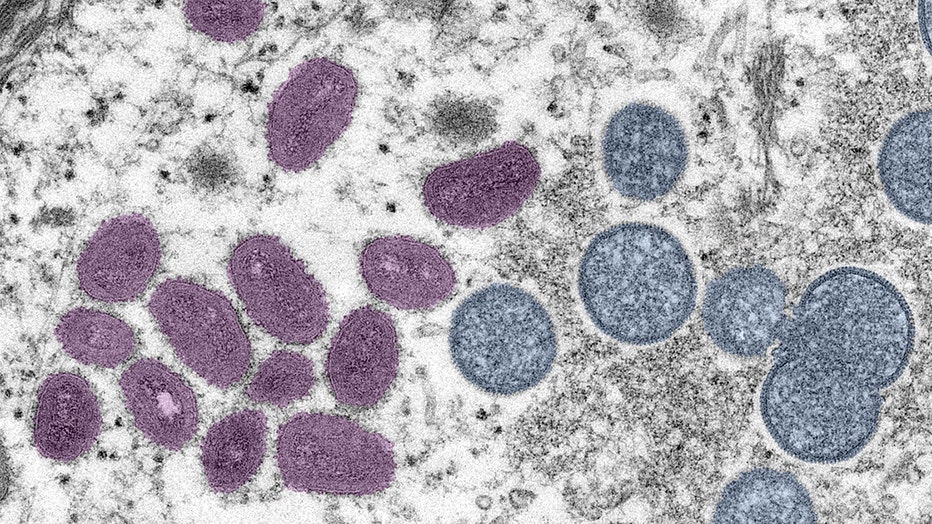NYC monkeypox cases double in a week; more vaccine doses coming

Monkeypox updates
The number of likely monkeypox cases in New York City has risen to 111. Also, Connecticut has reported its first case of monkeypox.
NEW YORK - The number of likely monkeypox cases in New York City has doubled in a week.
As of Tuesday, July 5, 111 people in the city have tested positive for orthopoxvirus (see below) and all likely have monkeypox, according to the city's Health Department. That is up from 55 cases a week earlier.
"Most of these people have had mild illness, have not been hospitalized and have recovered on their own," the Health Department said on its website. "Even with mild illness, the rash and sores from monkeypox can be itchy and painful."
The current outbreak is among gay, bisexual and other men who have sex with men, the Health Department said, but anyone can get and spread monkeypox.

A digitally colorized electron microscopic image showing a monkeypox virus particle obtained from a clinical sample associated with an outbreak in 2003. (CDC File Image)
Monkeypox Symptoms
Monkeypox begins as a rash or sores that can look like pimples or blisters. These bumps can appear all over the body — including your face, hands, feet, mouth, genitals or anus — and can become infected.
The symptoms usually start between a week to two weeks after exposure but may not appear for up to 21 days. The sickness can last from two to four weeks with flu-like symptoms including fever, chills, fatigue, swollen lymph nodes, headache, and body aches and pains — like a weaker version of smallpox.
"If you have a new or unexpected rash or other symptoms of monkeypox, contact a health care provider," the Health Department states. "A person is contagious until all sores have healed, and a new layer of skin has formed, which can take two to four weeks."

Dr. Jay Varma on COVID and monkeypox
As the omicron subtypes BA.4 and BA.5 spread and cases of monkeypox rise in New York City, what are we in for? FOX 5 NY speaks with former City Hall public health advisor Dr. Jay Varma about the two diseases.
Monkeypox Vaccination
The city's public hospitals and Chelsea Sexual Health Clinic had been administering the monkeypox vaccine to people who are at high risk of contracting the disease or who had close contact with someone who has monkeypox.
But demand for the vaccine has been high, prompting New York City to request more shots. The federal government has approved the city for a new allotment of 6,000 doses, which is enough to vaccinate 3,000 people.
Vaccination involves getting two doses of the Jynneos vaccine, which the FDA has approved to prevent "smallpox and monkeypox disease in adults 18 years of age and older determined to be at high risk," the agency states. The doses are administered four weeks apart.
Right now, vaccine eligibility is limited to gay, bisexual, or other men who have sex with men and transgender, gender non-conforming, or gender non-binary people 18 and older who have had multiple or anonymous sex partners in the last 14 days.
"Providing vaccine for New Yorkers at highest risk of transmission will ensure more New Yorkers are protected against monkeypox," Dr. Ashwin Vasan, the city's health commissioner, said in a statement. "Thank you to our federal partners for providing the necessary support we need to curb transmission and keep New Yorkers safe. The City will continue to work with the federal government to secure additional doses."
What Is Orthopoxvirus?
Public laboratories in New York state test patient samples for orthopoxvirus, the genus, or group, of viruses that cause monkeypox, smallpox, and other diseases.
"Cases that are confirmed positive for orthopoxvirus are considered probable monkeypox cases because of the rarity of all orthopoxviruses, generally, and the presentation of symptoms, in confirmed orthopoxvirus cases, being consistent with monkeypox," the New York State Health Department states on its website. "Confirmed orthopoxvirus cases, or probable monkeypox cases, may be further confirmed as monkeypox through CDC testing."

